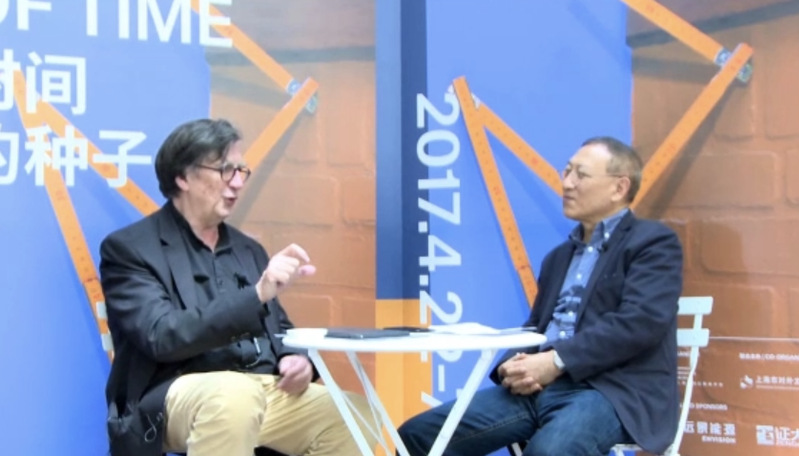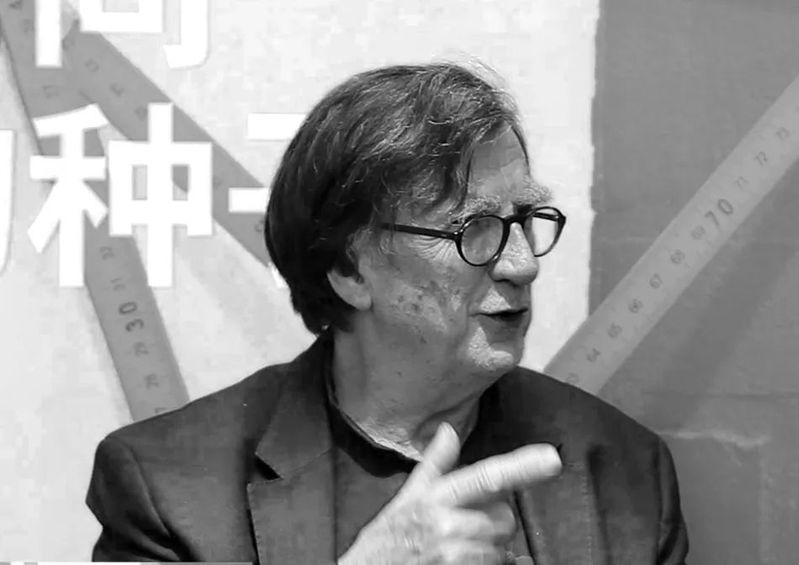新闻中心



2017“上海种子”项目上布鲁诺·拉图尔(左)与李龙雨(右)交谈
(图源:采访视频)
著名法国哲学家、人类学家布鲁诺·拉图尔(Bruno Latour)于当地时间10月8日晚间逝世,享年75岁。身体虽逝,但思想传世。拉图尔曾于我院开展关于气候变化的专题讲座,反响热烈。我院高峰团队引进的PI教授李龙雨教授曾与拉图尔有过学术交流并撰写了这篇纪念文章,摘录如下,以此作为对逝者的纪念。
布鲁诺·拉图尔:一位有创见的学术反传统者
Bruno Latour, the visionary and academic iconoclast (1947-2022)
One of the most insightful philosophers of our time, Bruno Latour, passed away on October 9th. Le Monde reported on the day that “Bruno Latour, thinker of the new climate regime, died. He is one of the most important French intellectuals of his generation.” In 2018, New York Times described him “the most famous and misunderstood of French philosophers.
我们这个时代最有洞察力的哲学家之一——布鲁诺·拉图尔(Bruno Latour),于10月9日与世长辞。《世界报》在当天的在讣闻中评价道:“新气候体制(New Climatic Regime)的思想家布鲁诺·拉图尔去世。他是这一代最重要的法国知识分子之一。”2018年,《纽约时报》曾称他为“最著名的、最受误解的法国哲学家”。
Arguably Latour was a very rare and challenging spirit willing to cross the interdisciplinary boundaries between philosophy, anthropology, science, history, sociology, ecology & climate change movement, and even exhibition making. The admiration and doubts surrounding him are not irrelevant to his relentless spirit of challenge and experimentation.
拉图尔可以说是一个非常罕见的具有挑战精神的人,他愿意跨越哲学、人类学、科学、历史学、社会学、生态学和气候变化运动甚至策展等学科的界限。那些围绕在他身上的钦佩和质疑,与他不懈的挑战与实验精神不无关系。

In March of this year, I invited Bruno to a forum titled “Art and Architecture in the Age of Ecological Crisis” held in Venice around opening of Venice Biennale. Bruno informed me later through his friend that it would be difficult for him to participate due to health issues, and he apologized. I was told that he stopped all external activities due to the onset of pancreatic cancer. He probably wanted to manage the last part of his life quietly and alone.
今年3月,我邀请布鲁诺参与威尼斯双年展开幕时举办的一个题为“生态危机时代的艺术与建筑”(Art and Architecture in the Age of Ecological Crisis)的论坛。后来布鲁诺通过他的朋友对我表示歉意——由于健康问题,他无法参加。因为胰腺癌的发作,他停止了所有的对外活动。也许他希望可以安静地独自度过生命的最后一段时光。
In 2017, when I invited Bruno to participate in Shanghai Project as a root researcher, which I co-curated with Hans Ulrich Obrist, he stayed in Shanghai for a week, organizing forums, workshops and exhibitions with Chinese anthropologists, philosophers and architects. He also gave a special lecture on climate mutation at the invitation of Tongji University. At that time, professors related to architecture and humanities at Tongji University were working with the Shanghai project and Latour workshop, in particular.
2017年,当我邀请布鲁诺作为“根基”研究员参与我和汉斯·乌尔里希·奥布里斯特(Hans Ulrich Obrist)共同策划的“上海种子”项目(Shanghai Project)时,他在上海逗留了一周,同中国的人类学家、哲学家和建筑师一起组织了论坛、研讨会和展览。他还应同济大学的邀请做了一个关于气候变化的专题讲座。彼时,同济大学建筑、人文相关专业的教授们正就“上海种子”项目与拉图尔工作室合作。
In a special conversation with me prepared by the Shanghai Project, he explained why the philosopher curate exhibitions, saying, “Why shouldn't philosopher make exhibitions? You can meet a large audience with a clear motive, the exhibition has an appeal to convey visual signs through concentrated keywords, and the audience can be transformed. There are many ways to meet readers and exhibition is a powerful tool.”
在“上海种子”项目筹备的特别谈话中,他解释了他作为哲学家却参与策划展览的原因:“哲学家为什么不能做展览?哲学家可以带着明确的目的接触大量的观众,而展览具有通过集中的关键词传递视觉信号进而影响观众的感染力。与读者接触的方式有很多,展览是一个强有力的工具。”
An audience asked Latour a nasty question. You seem to be much more famous internationally than in France. Is it true that the prophet is not well-received in his hometown? Why do they call you an academic iconoclast? Bruno stood in a clear position. “All healthy blood vessels flow well without blockage. Academic research is like a blood vessel with various branches. Wouldn't it be better to see things and the truth better if we look at it from a wide perspective in various fields rather than insisting on only one study as a motive? Both science and art need a rational dogma, and that is what sets them different. Politics is also supported when it is a beautiful dogmatic line.” He emphasizes the need for rational dogma and the dogma in academics just like artistic creation. He thinks that philosophy without rational arbitrariness is a grey, and it is evaluated as a relativist theory.
一位观众曾向拉图尔提了一个令人讨厌的问题:“您在国际上似乎比在法国更出名,预言家在他的家乡真的不受待见吗?为什么他们称您为学术性的反传统者(academic iconoclast)?”布鲁诺的回复表明了清晰的立场:“所有健康的血管都能很好地流动而不堵塞,学术研究正像一条具有各种分支的血管。如果我们不坚持固守一项研究领域,而是从不同领域、以更宽广的视角来观察,不是能更好地看清事物与真理吗?科学和艺术都需要理性的教义,这是它们的不同之处,当政治也是一条美妙的教义时也是如此。”他强调在学术上需要理性的教义,就像艺术创作一样。他认为没有理性任意性的哲学是灰色的、被评价为相对主义的理论。

At the peak of the pandemic in 2021, Bruno Latour articulated his position as an activist rather than a visionary or theorist on climate change by delivering a prophetic message to global readers in his book After Lockdown: A Metamorphosis. He takes a very radical stance. About the belief that we can finally go back to the fun life of the past when the lockdown between villages, cities, and countries are lifted by taking off our masks, he says, we cannot and should not try to get out of lockdown. Lockdown teaches crucial lessons about how to live, or more precisely, how to dwell and coexist with other species on the earth.”
在2021年疫情高峰期,布鲁诺·拉图尔在他的《封锁之后:一部变形记》(After Lockdown: A Metamorphosis)一书中向全球读者传递了预言性信息,阐明了他在气候变化上是作为一个活动家而不是空想家或理论家的立场。他采取了一种非常激进的态度——针对那些相信当摘下口罩,解除了村庄、城市和国家之间的封锁后,终会回到过去那有趣的生活的想法,他说:“我们不能也不应该试图摆脱封锁。封锁教会了我们如何生存,或者更准确地说,如何与地球上的其他物种同居和共存。”
He also argues “Today's global health crisis is a rare opportunity to learn to live in the closed state created by the new climate regime. It's kind of like a dress rehearsal of climate mutation, so to speak, and it's finally an opportunity to fully understand what our 'Earth' is and what we're going to be like in the future. Finally, it is our chance to explore the land inhabited by all other living beings. Humans should emulate termites – even though they live in mounds made from masticated earth and faecal matter. Because they do not lay waste to the Earth. We must productively recycle our waste and consume little.” His new ecological regime seems clearly unveiled the fact that social justice and ecological crisis recognized as aligned.
他还认为,“今天的全球健康危机是一个难得的机会,让我们学会如何在新气候体制创造的封闭状态下生活。可以说,这有点像是气候突变的彩排,让我们最终有机会充分了解我们的“地球”是什么以及我们未来会是什么样子。最后,这也是我们探索所有其他生物居住的土地的机会。人类应该效仿白蚁——尽管它们生活在由咀嚼过的泥土和粪便组成的土堆里——因为它们不会对地球造成浪费。我们必须有效地回收我们的废物,并且减少消耗。”他的新生态体制似乎清楚地揭示了社会正义和生态危机的一致性。
Bruno’s guides line on ecological practice has a clear definition called “Critical Zone”. “Three kilometers above the ground and three kilometers underground, including the sea, is a critical zone for all chosen beings. This realm is not a space where resources are endlessly exploited and wasted, but rather to protect each other and cultivate ecologically, it is the only space for human existence to coexist in the future. Like terroir(earth) in a vineyard”.
布鲁诺的生态实践指南中有一个概念叫“关键带”(critical zone),它被明确地定义为“距离地面三公里,地下三公里,包括海洋,是所有被选中为生命的关键地带。这个领域并不是一个可以无休止地开发和浪费资源的空间,需要相互保护与生态培育。它是人类未来从生存到共存的唯一空间,就像葡萄园里的土地(terroir[earth])一样”。
Based on Latour’s critical zone, he and his 4 collaborators curated an exhibition titled Critical Zone at ZKM (Zentrum fur Kunst und Medien Karlsruhe) in Karlsruhe, Germany. This multidimensional showcase, subtitled Horizons of New Earth Policy, is a groundbreaking exhibition that proposes alternative ideas after pandemic. ZKM held this exhibition for 19 months from May 2020 to January 2022.
基于拉图尔的“关键带”概念,他和他的四位合作者在德国卡尔斯鲁厄艺术与媒体中心(Zentrum für Kunst und Medientechnologie,简称ZKM)策划了一个名为“关键带”的展览。这个副标题为“新地球政策的地平线”(Horizons of New Earth Policy)的多维展览提出了一些后疫情时代的可能性想法。ZKM给这个开创性的展览以长达19个月的展期(2020年5月—2022年1月)。
“People need something to disagree with, something strong enough intellectually, not just a slogan. Exhibition making is another way of researching my rational dogma. Through three times of exhibitions, I made a definitive point about all these questions about iconoclasm. Because it was so massively informative with a very clear, but only one idea, very simple idea, to compare all the iconoclastic gestures and value situations.” Bruno has written a short memo on curating and the importance of the critical zone show.
布鲁诺写过一份关于“关键带”展览策划及其重要性的简短备忘录:“人们需要一些可提出异议的东西,在智性上足够强大的东西,而不仅仅是一个口号。举办展览是研究我的理性教义的另一种方式。通过三次展览,我对所有这些关于打破传统的问题提出了明确的观点。因为它提供大量信息的同时,有着一个非常清晰、简单的想法,那就是比较所有反传统的姿态和价值状况(to compare all the iconoclastic gestures and value situations.)。”
Most of the collaborating partners who have been working on research projects with Bruno have been philosophers, anthropologists, publishers, architects, urban planners, curators, designers, environmentalists, and his absolute allies, the media.
与布鲁诺从事研究项目的合作伙伴大多都是哲学家、人类学家、出版商、建筑师、城市规划师、策展人、设计师、环保人士,以及他的绝对盟友——媒体。
His surname Latour is reminiscent of the Latour family, a luxury wine producer in the Bordeaux region, but he was actually born as the son of a wine producer, Latour, in the Bourgogne (Burgundy) region. From an early age, he was always troubled by his father's sanction to work in the vineyard, but as a vineyard worker, he did not fit in. What later made him a philosopher was probably the motivation from the vineyard.
他的姓氏拉图尔让人联想起波尔多地区的奢侈葡萄酒生产商拉图尔家族。而实际上,他是出生在勃艮第地区的葡萄酒生产商拉图尔的儿子。从很小的时候起,他就一直被父亲要求他在葡萄园工作的独裁所困扰。他并不适应成为一个葡萄园工人,或许这也是后来促使他成为哲学家的诱因。
I thought that the burgundy wine he served me in his Paris apartment tasted exactly like Bruno. Somewhat strong, solid, and consistent. The advantage of those who believe in reincarnation is that they are not pessimistic about parting. I'll see you somewhere.
我觉得布鲁诺和他在巴黎公寓时给我的勃艮第葡萄酒的味道一模一样,有点浓烈的、厚实的、始终如一的。相信转世轮回的人的好处是,他们对离别并不悲观。我会在某个地方见到你。
再见, Bruno!
再见,布鲁诺!